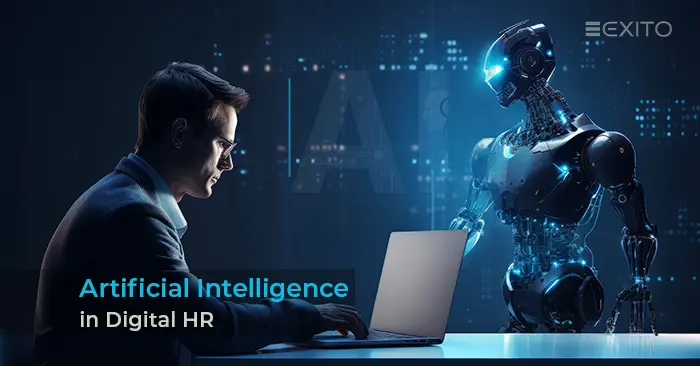Role of Artificial Intelligence in HR
INTRODUCTION:
Recent studies state that over 65% of HR Leaders have come to terms with the fact that AI has acted as a catalyst for efficiency and productivity in HR practices.
CHROs and high-level HR leaders alike have managed to navigate through the dynamic HR workforce with the infusion of artificial intelligence, a powerful tool that drives constant growth. All in all, to promote HR Automation, harness data-driven decision-making, personalize Interactions and secure data through Cloud Computing, it’s crucial for HRs to take the first step in rendering HR the title of “Digital HR”.
Get on board with us and unveil the strategies imperative for a HR to set the stage for a future where innovation takes shape. Listed down below are some of the most challenging pain points faced by a HR along with the solutions to tackle them efficiently.
Unbiased decision-making challenges
The current challenge that HR professionals are struggling with involves inability to harness the power to make decisions quickly without any human biases involved.
Solution:
One such way to address this ongoing challenge would be to integrate Artificial Intelligence solutions that will help one to make decisions on time, without any biases in question. By conducting quick analyses on employee skill sets, obtaining feedback and queries, AI contributes to a seamless cycle of decision-making. This act, further enables us to execute logic-driven results, without having the fear of human errors and possible attempts of partiality.
This is particularly a boon during the appraisal and recruitment processes, as AI can identify the efficiency levels of each employee and boost fair results.
Competitive hiring landscape
In a competitive world as that of today, CHROs face a big challenge to secure top talent for the desired vacancy. They put their best foot forward to make sure they get an employee that reaches their expectations and also brings ample value to the organization.
Solution:
To deal with this aching pain point, recruiters have come together to conduct various tests and shortlist the potential candidates based on their job profiles.
The internet of things plays a huge role here. Integrating IoT solutions in identifying the candidates that are best fit for the role, by the process of analyzing past experiences and aligning those experiences with the job requirements makes recruiting simpler than ever.
Furthermore, a strategic approach that stands out is the ability of AI to conduct psychometric tests to assess not only the external criteria for the job but also the internal qualities that make him/her suitable for carrying out the tasks involved in the job.
This is indeed one of the most strategic approaches to make recruitment easy by choosing the best candidates out of the prospective lot.
Issues about low employee engagement
CHROs are still on the lookout for solutions that enable effective engagement among employees in an environment run by technologically advanced tools. Today, the traditional methods of employee feedback and recognition no longer prove to be effective, and to tackle this set back in the work environment, HR leaders have no choice but to resort to innovative solutions to renew the life of employee engagement tactics.
Solution:
HR chatbots have been a life saver for HR leaders to tackle the ongoing engagement challenges. With the power of these conversational agents, employees can interact with a bot that carries out human-centric conversations. These conversations ensure anonymous feedback, maintaining a confidential and secure place for employees to share their concerns.
The data collected through these chat-bots assist CHROs in effectively tailoring their strategies to bring forth a favorable work environment. HR Chatbots have taken the leap in today’s era where messaging apps are on the rise to facilitate digital communication. This approach catalyzed by technology’s intervention has made it possible to foster an engaging and approachable workplace.
CONCLUSION
Digital HR has shaped the very existence of HR practices and now more than ever, HR automation is a crucial element for the smooth functioning of workspaces. AI can improve HR operations to an extent where the sole task of CHROs is simplified and enhanced significantly.
Keep revisiting our page to dig deeper into more strategies and tips on how to tackle challenges faced by HRs!
FAQs:
1. How is artificial intelligence used in HR?
Ans: Artificial intelligence is the brain behind all the fascinating advancements we come across. In the context of the HR realm, AI helps in quick decision-making, seamless recruitment process and identifies top talents via psychometric tests.
Overall, AI drives growth in the HR landscape and increases efficiency, thereby cutting down on additional steps that seem to hinder the delivery of quick results.
2. What is the future of artificial intelligence in HR?
Ans: After HR professionals have managed to get access to AI-powered tools, every initial level tasks of an HR including scanning resumes, analyzing candidate profiles and conducting interviews has become faster. This transformation will most definitely enable HR teams to shift their attention to much bigger aspects of talent acquisition that will go haywire if not attended to in an efficient manner.
- What is digital technology in HR?
Digital HR is simply the digital transformation of HR practices from implementation to the end execution. It involves the use of modern tools like cloud computing, AI and analytics. Once an organization chooses to undergo this shift, it should prepare itself to adapt to the evolving changes that come along the way. This is how artificial intelligence impact human resources and drives endless growth in the long-run.




 February 13th, 2024
February 13th, 2024 Exito
Exito
Leave a Reply